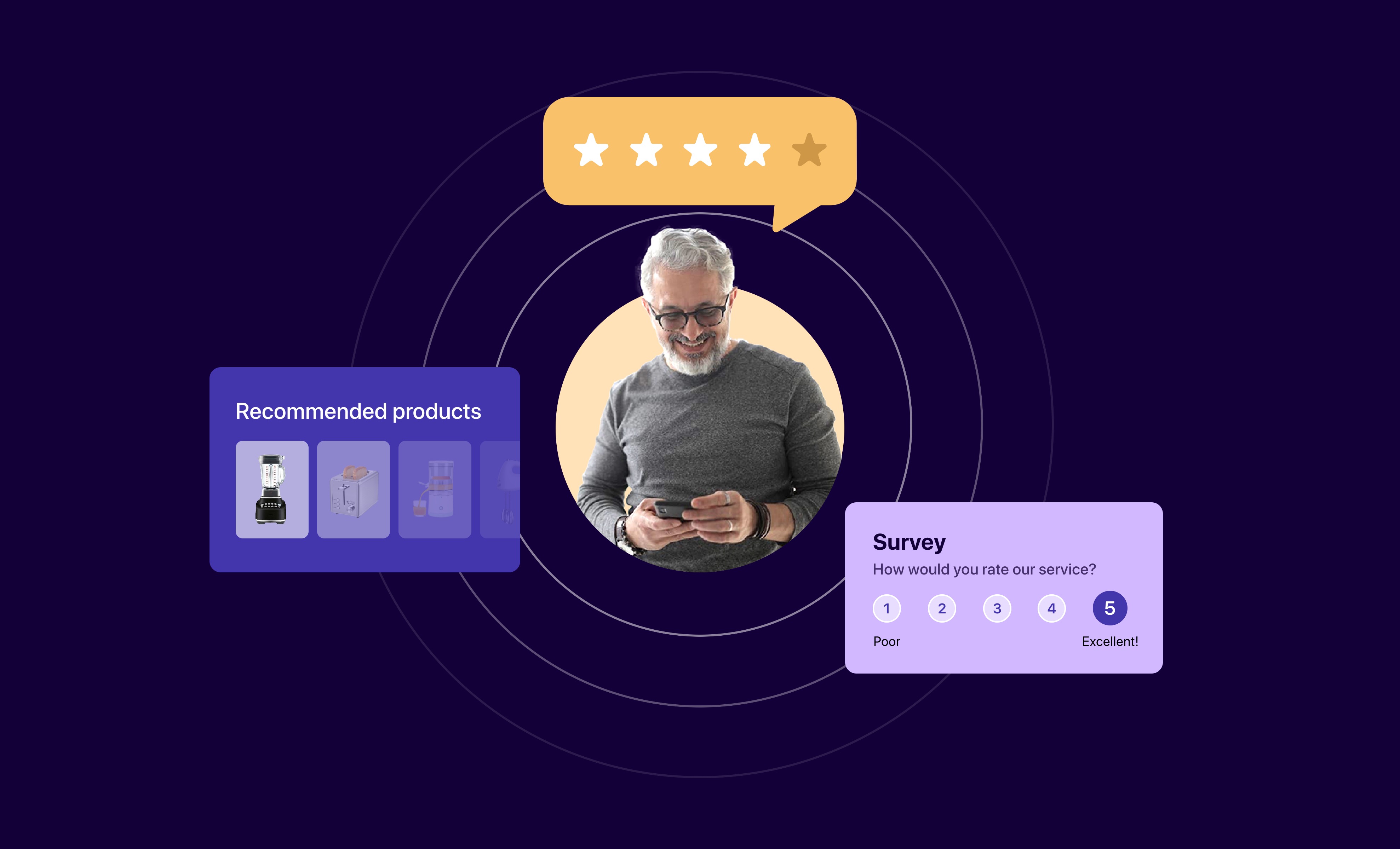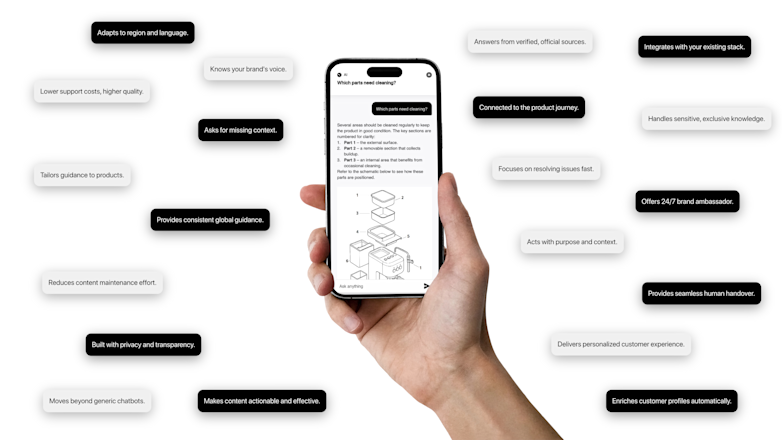
We live in a world where telling the difference between retailers is increasingly challenging. Standard tactics like pricing and promotions that make a company stand out are no longer effective. It is so easy for other companies to imitate them. On top of that, customer preferences have changed a lot. Customers are moving away from generic brands and prefer more personalized information and experiences.
A study by McKinsey and Company showed that customers nowadays view personalization as the default standard of interaction. 71% of customers expect companies to deliver personalized interactions, and 76% become frustrated when this desire is unmet. Microsoft also conducted a survey that found 77% of customers like brands that ask for and accept their feedback. It means that it's important for brands to listen to their customers to build trust and loyalty.
With this in mind, how do you develop a unique and personalized experience for everyone, not just once, but every single time? Here, we will show you how to do this, whether you're new to it or looking for more ways to provide personalized experiences.
What is a personalized customer experience?
Personalized customer experience refers to developing and providing products, services, and relations in a way that is tailored to meet each customer's unique requirements. It can be from simple steps like greeting them by their first names to designing messages, offers, and recommendations that align with their interests. Executing this well enables companies to set themselves apart from others and acquire a more competitive advantage.
Personalizing customer experience works by using customer information to adjust their experience at every step. It often provides an experience wholly unique to each customer. There is a need for companies that have not yet assimilated a personalized customer experience to adopt it. Still, there is also an opportunity for the ones that already have it to improve on it. Research shows that companies that succeed at personalization generate up to 40% more revenue from those activities than their competitors in the same field.
Why is personalization important in customer experience?
Just a slight improvement in personalization can have a significant impact on everyone. Below you will find four main reasons why personalization of customer experience is important for your business.
1. Customer satisfaction and retention
Personalization allows companies to tailor their interactions and ultimately their products to meet the specific needs and preferences of individual customers. By providing a personalized experience, companies can enhance customer satisfaction, leading to increased retention and revenue boost. When customers feel understood and valued, they are more likely to remain with the brand and recommend it to others.
2. Competitive advantage
In today's highly competitive business landscape, companies need to differentiate themselves from their competitors. Offering a personalized customer experience can be a significant competitive advantage. A survey by Adobe Commerce found that 67% of customers want personalized offers based on their spending preferences, whether they shop online or in person. This means that customers are more likely to choose a company that understands their unique requirements and provides tailored solutions. Personalization can help companies stand out and attract new customers in a crowded market.
3. Increased trust and loyalty
Personalization helps to create a deeper and more meaningful connection with customers. When companies understand their customers' preferences, behavior, and history, they can deliver relevant and targeted content, recommendations, and offers. This level of personalization enhances customer engagement, encourages active participation, and ultimately boost brand loyalty.
4. Data-driven insights and decision-making
Personalization requires the collection and analysis of customer data. By gathering customer information, companies can gain valuable insights into customer preferences, behavior patterns, and trends. This data can inform strategic decision-making, product development, marketing campaigns, and overall business strategies. Personalization enables companies to make data-driven decisions that are aligned with customer needs and preferences, leading to more effective and successful outcomes. Read more about how to collet customer data here.
Why do consumer companies need to personalize customer experience?
Offering a superior experience to the customer that just purchased your product is a must, if you want to gain competitive advantage. Consumer good companies are often focused on developing a great product and they forget how important the experience that comes with the product is. Tailored experiences at any point in a customer's interactions make the customer more responsive to the company's interactions. For example, one benchmark report found a 139% increase in click rate for personalized emails instead of one-time emails. It increases the customer's value of the company, which will breed their loyalty to the company. That automatically leads to a higher return on investment.
A survey of 1,000 US adults by Epsilon and GBH Insights found that 80% of customers want personalization from product companies. Personalization can even be called a “hygiene factor”: customers may not be that keen to notice its importance, but if a company gets it wrong, they may leave them for their competitor.
In today's business landscape, customers expect personalized experiences when making purchasing decisions. Meeting these expectations can significantly contribute to the success of your business, especially considering that many consumer goods companies have yet to embrace this approach.
By introducing multiple personalized touchpoints, you empower customers to allocate their time and money based on their preferences. Engaging in customized experiences allows consumer brands to involve customers in a meaningful dialogue and leverage the data they gather to create tailored personalizations. This strategic approach provides a distinct competitive advantage over other brands that merely offer generic, one-size-fits-all deals to their customers. By ensuring that offers, products, and communications are unique to each individual consumer, your company can foster a deeper sense of connection and loyalty. If you want to know more about how to personalized customer experience with Layerise, click here.
Benefits and challenges of creating a personalized experience
When addressing the importance of a personalized customer experience, we discussed some of the benefits of this to the consumer. However, there are also great benefits to the product company.
Increasing conversion rates – Personalized marketing strategies are more effective at fueling conversions than generic strategies. Customers receiving offers and promotions relevant to their interests and needs are more likely to give more business to the company.
Increasing sales and generating more revenue – when a company targets the appropriate customers with the right message at the right time, they are more likely to increase sales and revenues. It can help the company upsell, cross-sell and even retain those customers more effectively.
Improving customer retention – one of the greater benefits of personalization is creating stronger customer relationships. It is mainly done by creating a more tailored and relevant experience. That, in turn, translates to the company's ability to work with more loyal customers.
Improving data – through customer data collection, companies gain valuable insight into each customer's preferences and needs. This information will help the companies optimize their market strategies to bring more business in.
All in all, personalization is a powerful tool for companies who are interested in creating ways to stay more engaged and relevant to their customers. However, this comes with several challenges that may prove to be a roadblock:
Challenges along the way
Some of the challenges that companies may encounter while implementing a personalized marketing strategy are:
Data privacy – Navigating the collection and security of customer data can pose challenges, especially considering concerns surrounding data privacy and stringent regulations such as the GDPR. However, with Layerise, you can address these concerns effectively. Layerise is a customer data platform that enables companies to collect customer data while ensuring compliance with GDPR regulations.
Expectations – Customer expectations play a crucial role in the success of companies. With the increasing demand for personalized experiences, failing to meet these expectations can result in a loss of sales and customer loyalty. Therefore, it is imperative for companies to carefully plan their approach to customer experience personalization and take data-driven decisions.
Cost – A good customer experience strategy requires a lot of investments in technology and infrastructure. Companies may need to acquire new software for collecting and analyzing customer data.
Obtaining accurate and relevant data – Personalization requires accurate and relevant data. If a company lacks access to quality data or, in some cases, uses obsolete data, its entire marketing campaign can be compromised. Here you can read about how Forms can help you collect the data you need.
Ethics and responsibility – Companies should be cautious when ethically using customer data. They should be transparent about their data collection process and policies. In particular, they should make sure to obtain consent from customers before using their data.
Company management silos – Companies that are siloed or convoluted regarding data management or approvals find it hard to use data easily. If different teams in a company handle different parts of the customer experience, they must collaborate to ensure a seamless and personalized experience.
Personalization can offer many benefits, making it a worthwhile investment. Overcoming these challenges is crucial to delivering a more personalized customer experience.
How can you provide a personalized customer experience?
Achieving success in customer experience personalization requires a well-crafted plan to turn goals into reality. Here are some of the ways that companies can use to obtain success in customer experience personalization.
1. Understanding Customer Expectations
The goal is to get a good outlook on your customers' preferences. Some of the strategies used include conducting regular opinion polls and customer surveys, tracking what customers post online about your company and other products offered by competitors, and analyzing online customer reviews.
2. Segmenting the Customer Base
To personalize experiences, companies need to segment their customer base into different groups. That lightens the load.
For instance, you can do this by:
Segregating customers who prefer to shop from offline stores from those who enjoy online shopping.
Urging males and females to indulge in buying products that are specific to their gender.
Using age to differentiate age groups and show different buying habits.
3. Diverse implementation
Upon understanding what customers expect from your company when they interact with it is important to look towards creating memorable experiences. Implementing this strategy across multiple channels. Also, make sure that regardless of the means that customers contact you, you give them a seamless experience.
4. Taking stock of the journey
Create a complete customer journey map for each customer as they interact with your company. If customer data is already present, go through it for trends while taking note of which areas the current customer experience works best.
Finding touchpoints where personalized recommendations lack and being vigilant to how and when customers move across the various channels on their journey with the company. From this, figure out their next stage and discover ways in which you can guide them using personalized content.
5. Define important personalization criteria
Before personalizing customer experiences, data is required. Companies need to know what type of data will be most helpful to guide their personalization efforts. Quality data will depend on the company's needs. Some of the most common types of collected data include customer location, behaviors, demographics, purchase history, and on-site search history.
Once a company settles on the information that would be most useful for them, they can go ahead and start gathering it from customers in a transparent way. The use of creative ways to collect information is important at this stage.
The role of customer data collection and how Layerise can help you with that
Customer data collection helps companies identify the customer segments. Demographic, psychographic, and geographic segmentation allows companies to adjust their marketing campaigns. Behavioral segmentation is one of the most reliable types for companies trying to develop customer-centric strategies and put efforts towards smarter acquisition and retention of customers. Read more about how to collect data on your customers here.
Knowing the key segments enables a company to attract and retain customers effectively. Recurring high-value customers are essential for the sustainable growth of any company. After the company has invested most of its resources in attracting new high-potential customers, it would do it well to improve the onboarding campaigns and make the efforts worthwhile. Here the focus should be on generating positive emotions and nurturing trust. All these are aimed at increasing the chances of receiving a second purchase from a first-time buyer.
So, how does Layerise facilitate this process?
Layerise is built for consumer good brands to enhance customer experience and boost revenue growth. Thanks to Layerise you can harness the power of intent data to gain valuable insights into your customers' behaviors and preferences, allowing you to make smarter marketing decisions, increase sales, and build long-lasting relationships.
Businesses that use customer insights perform significantly better than their peers, with an 85% increase in sales growth and over 25% higher gross margin. Want to unlock customer insights and boost your sales? Use Layerise to create personalized customer experiences, improve conversion rates, and attract new business. The tool helps your brand stay ahead in today's competitive market.
Learn how to collect valuable insights on your customers to sell even more.

How to Turn a New Obligation into a Growth with Layerise

A trusted, brand-safe AI assistant that knows your products, your customers and your content.





